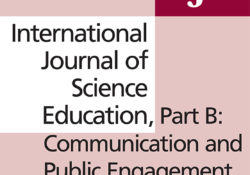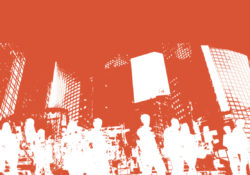eric.ed.gov har udgivet: The cubic polynomial with real coefficients has a rich and interesting history primarily associated with the endeavours of great mathematicians like del Ferro, Tartaglia, Cardano or Vieta who sought a solution for the roots (Katz, 1998; see Chapter 12.3: The Solution of the Cubic Equation). Suffice it to say that since the times of renaissance mathematics in Italy various techniques have been developed which yield the three roots of a general cubic equation. Students studying a mathematics specialism as a part of the Victorian VCE (Mathematical Methods, 2010), HSC in NSW (Mathematics Extension in NSW, 1997) or Queensland QCE (Mathematics C, 2009) are expected to be able to recognise, plot, factorise, and even solve cubic polynomials as described by ACARA (ACARA, n.d., Unit 1, Topic 1: Functions… Continue Reading →
Like this:
Like Loading...
tandfonline.com har udgivet en rapport under søgningen “Teacher Education Mathematics”: ABSTRACT ABSTRACT The nature of the learning that occurs with real versus replicated objects and environments is an important topic for museums and science centers. Our comparative, exploratory study addressed this area through an investigation of family visits to two different settings: an operating permafrost research tunnel, and a replica of this permafrost tunnel at a science center. We conducted and analyzed family interviews, grounding our work in the Contextual Model of Learning and ideas about sensory components of learning. We found significant differences between the real and replicated environments in terms of what families discussed during interviews. Specifically, the proportion of perceptual (descriptions of features or sensory-based perceptions) talk at the real tunnel was higher than that at the… Continue Reading →
Like this:
Like Loading...
eric.ed.gov har udgivet: In this article, author Jennifer Dubin offers a look into the innovations taking place in the Toledo Technology Academy (TTA), a career-tech school within the public school system in Toledo, Ohio. TTA teaches students in grades 7 through 12 using a science, technology, engineering, and math (STEM) curriculum, in addition to the traditional academic subjects of English, history, science, and math. When graduates from TTA leave, they have a career portfolio, which can include certifications attesting to technical expertise as well as letters of recommendation from teachers and companies that had hired them for school-sponsored internships. The student’s portfolio showcases knowledge and skills to a prospective employer, or can be submitted to a college admissions office along with the standard application. Dubin notes that the school’s emphasis… Continue Reading →
Like this:
Like Loading...
eric.ed.gov har udgivet: This issue offers a collection of timely topics focused on mathematics and science education. It uncovers the past, present, and future of the national standards movement in mathematics and science education with two articles entitled “Setting Standards for Excellence” and “On the Road to REAL Progress.” A close-up look at students doing real-life water ecology research is provided. This issue also features articles on “Math Wars,” teacher shortages, and curriculum research centers. (ASK) Link til kilde
Like this:
Like Loading...
tandfonline.com har udgivet en rapport under søgningen “Teacher Education Mathematics”: Abstract Abstract This paper is the culmination of efforts by a group of participants at the 32nd Annual American Real Estate Society Conference in Denver who met to discuss the future of real estate education, and its authors represent the diversity and breadth reflective of the field itself. Previous literature, spanning more than 50 years, has consistently maintained that the issues related to the study of real estate are too complex to easily resolve, resulting in a lack of consensus regarding an accepted body of knowledge. This paper is unique in that it not only identifies issues and challenges inherent in today’s academic climate, it also provides for a collection of options, both applied and aspirational, that build on existing… Continue Reading →
Like this:
Like Loading...
eric.ed.gov har udgivet: Children who grow up in poverty are less likely to graduate high school, enter college and find economic stability. REAL School Gardens believes the right educational opportunities — ones that engage and motive children to learn — can break this cycle. The REAL School Gardens Program builds learning gardens and offers teacher training to improve academic engagement and performance in low-income elementary schools. Since its launch, REAL School Gardens has partnered with 92 low-income schools, and preliminary findings show that 84% of students experiencing hands-on academic lessons in a REAL School Garden report high levels of engagement, specifically in math in science. Another study demonstrated that REAL School Gardens’ partner schools exhibit, on average, standardized science test score pass rates 5.5% higher than non-partner schools. This article… Continue Reading →
Like this:
Like Loading...
eric.ed.gov har udgivet: This article presents a new paradigm for the study of Math and Sciences curriculum during primary and secondary education. A workshop for Education undergraduates at four different campuses (n = 242) was designed to introduce participants to the new paradigm. In order to make a qualitative analysis of the current school methodologies in mathematics, participants were introduced to a taxonomic tool for the description of K-12 Math problems. The tool allows the identification, decomposition and description of Type-A problems, the characteristic ones in the traditional curriculum, and of Type-B problems in the new paradigm. The workshops culminated with a set of surveys where participants were asked to assess both the current and the new proposed paradigms. The surveys in this study revealed that according to the majority… Continue Reading →
Like this:
Like Loading...

